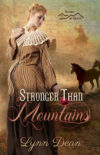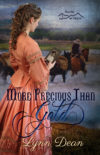Creating Emotion in Writing
Almost every writing class or craft book will tell you the same thing: fiction must create a compelling emotional experience. The problem is these teachers also let you know that if your character cries, the reader probably won’t.
So how do you build this emotion? Simply writing highly emotional phrases such as her heart pounded inside her chest won’t do the trick. Naming the emotion won’t work either. (She was angry.) You need instead to build warring emotions inside the character.
Remember the goal and motivation from Lesson One? Write it down again. Make sure the goal is concrete and difficult to reach. You need the concrete goal so the reader will know whether or not the hero obtains it. Sometimes students tell me their hero just wants to live a peaceable life. Personally, I think they need a more precise goal. Dig deeper.
Now that you’ve got a strong goal, write the opposite of that goal. How could your hero want these two opposite things? Suppose your hero wants to stop a villain from robbing a bank. Why might he not want to stop it? What if the thief was his younger brother? He wants to stop the robbery, but he doesn’t want to expose his own brother. Now you have warring emotions building inside the hero. Force him to make a choice: do the honest thing and stop the robbery or betray his own brother.
Forcing your hero to take a journey he dislikes, such as Finding Nemo or Shrek, causes conflicting emotions. They have a pressing need to go, but they don’t really want to. Or sending him on a journey he really wants, but placing road blocks that make him want to give up creates an emotional war inside. He wants this, but he doesn’t. Now he not only has to overcome the outer obstacles or the antagonist who hinders him, but he also has to struggle with himself.
The inner conflict of the character keeps a reader turning pages. Try it with your own hero and see if the story gains strength.
Exercise:
- Pick one of your favorite books. Think about the hero’s goal. Do they have strong motives for wanting their goal? Is there also a reason for not wanting it? Can you identity the conflicting emotions within the main character?
- Write down three reasons why your protagonist wants to reach his goal.
- Write down three reasons why he might not want to reach the goal.
- Tell me about the warring emotions of your character in the comment section below.
















My charecter wants to be adopted by her wealthy grandmother but also wants to be adopted by a loving family in the United States. If she is adopted by her grandmother, she will be able to live with her brother. But her grandmother does not like her spunky outgoing ways. They arn’t traditional. She wants to be true to herself but can’t do this and get her grandmother to adopt her. I am still working out the details but it is really coming along with your help! Thanks!
You’re getting the idea. An inner conflict often takes the form of wanting to “have our cake and eat it, too”–an either/or choice where there are strong advantages and strong disadvantages on both sides and no way to satisfy one desire without sacrificing the other. Of course, if you can figure out a twist at the end that will allow your main character to reach a compromise where everyone wins, it can be quite gratifying!